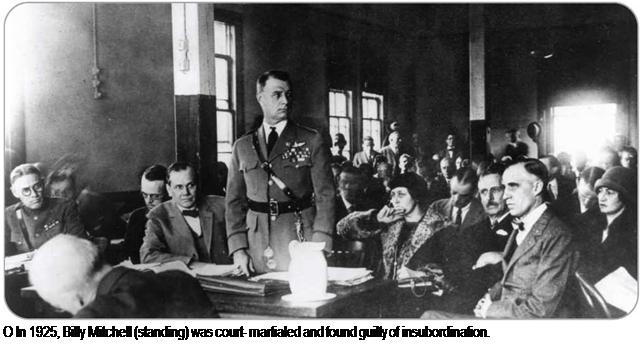Opposition
Mitchell’s work met resistance, however. Senior officers were not yet willing to accept the idea that air power would be important. They were outraged at Mitchell’s charge that battleships had become outdated. At that time, U. S.
battleships were the largest and most powerful ships in any navy. Naval officers insisted that the defense of the United States depended on a fleet of these ships to block any invasion of the nation.
Mitchell countered that the ships could easily be destroyed by air. He campaigned in the press for the right to test his theories. He suggested a simulated attack on a German battleship seized at the end of World War I. In June and July 1921, Mitchell got his chance. In tests, as he had predicted, aircrews sank several ships, including four battleships. “No surface vessels can exist wherever air forces acting from land bases are able to attack them,” Mitchell wrote.
Although proven correct, Mitchell remained unpopular in military circles. He continued to use the press to accuse senior military officers of ignoring air defenses. He toured U. S. naval bases in the Pacific Ocean and issued a stark warning: “If our warships [at Pearl Harbor, Hawaii] were to be found bottled up in a surprise attack from the air and our airplanes destroyed on the ground. . . it would break our backs. The same prediction applies to the Philippines.”
Mitchell’s words proved uncannily accurate years later, when the Japanese severely damaged U. S. ships and grounded airplanes with the 1941 attack on Pearl Harbor from the air.
C In one of Billy Mitchell’s tests to prove the value of air power, an MB-2 aircraft successfully blew up an obsolete battleship in 1921.
 |
Court-Martial
In early 1925, Mitchell’s appointment in the U. S. Air Service expired. Instead of renewing it, army commanders sent him to an isolated military base in Texas. Later that year, the navy suffered two air disasters when a seaplane broke down and a dirigible exploded. Mitchell immediately released a stinging attack on the heads of the navy and the army, accusing them of “almost treasonable negligence of our national defense.”
His superiors had had enough, and they convened a court-martial. Mitchell was charged with insubordination (not obeying senior officers). After a seven – week trial he was found guilty. The verdict was suspension from duty for five years, but Mitchell decided to resign from the U. S. Army altogether.
Mitchell spent his remaining years writing and speaking to promote the ideas he had long advanced. He became ill in the mid-1930s and died at the age of fifty-six. During World War II, Mitchell’s basic argument was proven true. Air power proved vital to Allied victory in both Europe and the Pacific.
In April 1942, a few months after the attack on Pearl Harbor, U. S. bombers attacked Japan using B-25s, nicknamed “Mitchells.”
In 1946, ten years after his death, the U. S. Congress voted to award Mitchell a Congressional Medal of Honor, in tribute to foresight.
SEE ALSO:
• Aircraft, Military • Curtiss, Glenn
• World War I • World War II
_______________________________________ J










